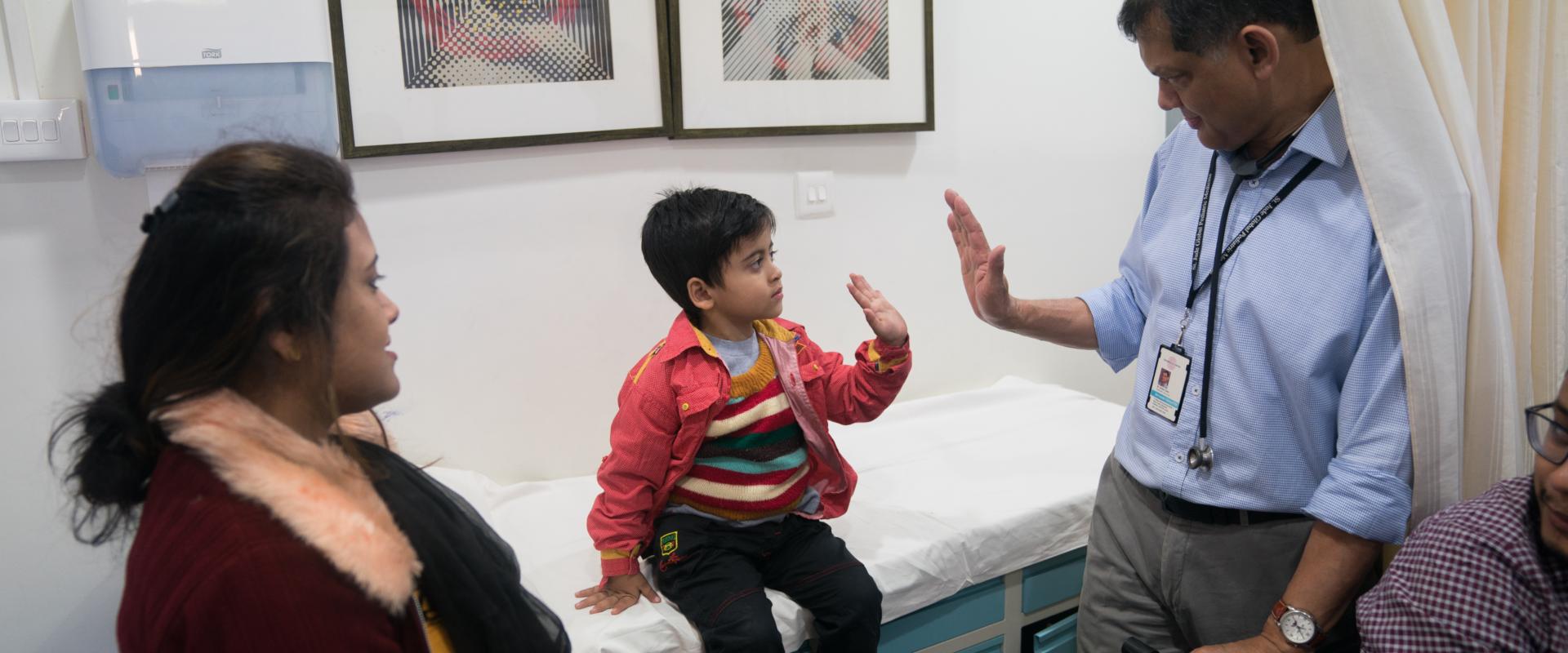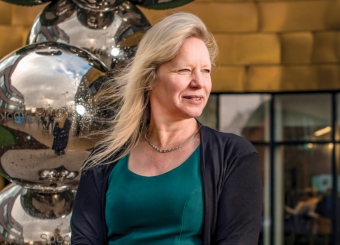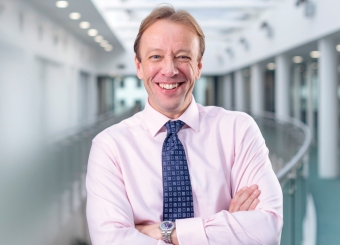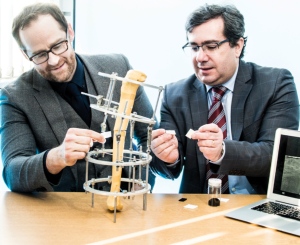When Professor Vaskar Saha saw the impact of childhood leukaemia in India, he asked: who can take on this challenge? Having already helped families across Europe to beat the disease, he knew that this was his calling.
For the past five years Professor Vaskar Saha, paediatric oncologist, has been travelling between two continents.
Splitting your life, two months here, three months there, is not a normal routine – but then, Professor Saha doesn’t do ‘normal’ work. His research at The University of Manchester has helped increase survival rates among children with acute lymphoblastic leukaemia (ALL) by 10% in the UK.
With survival rates up from 60% to 90% in the west, the challenge is to bring about similar improvements in other parts of the world. It’s a challenge that has brought him to India, where we meet him to hear his story.
Parity in survival
His bare-walled, seemingly paperless office at the Tata Medical Centre (TMC) in Kolkata belies the amount of work Professor Saha has undertaken since embarking on this Anglo-Indian project. Around 4,000 families across India have benefited from better treatment, thanks to systems and protocols he brought with him from Manchester and shared with other hospitals across the country.
“I wanted to see if the science as applied in the NHS and Europe could also be applied to help children in less developed countries have the same opportunities for surviving,” he explains.
For me, that a child in 2019 can still die of a disease that is curable is unpalatable.
Back in Europe, Professor Saha’s work had influenced UK and European guidelines on the treatment of children with ALL. His research helped the UK have one of the highest rates of survival from childhood leukaemia anywhere in the world. But families elsewhere are less fortunate: 80% of the world’s children live in low-resource countries. For this softly spoken paediatric oncologist, this disparity was the spur for his global journey.
“In these countries ALL remains a fatal disease. Yet ALL is curable. For me, that a child in 2019 can still die of a disease that is curable is unpalatable,” he continues.
“At its simplest, 15,000 Indian children are diagnosed annually and only 9,000 of these will survive. So even if we can improve outcomes in India by 10%, then an additional 1,500 children a year will grow up to lead normal lives.”
Confronted by the challenge
A particular moment put everything in focus. Professor Saha was already exploring how his research could help to increase survival rates for Indian children when he met a family whose search for treatment to save their daughter had sunk them into poverty.
“This family were forced to give up their jobs and sell their home,” recalls Professor Saha. “I was reduced to tears but they were happy and they said: ‘You see, everything you have is for your child. So if your child is well at the end of it, that’s all that matters.’ I thought: ‘I understand that, but surely the journey doesn’t have to be that hard?’“
“This was the start of my journey. I knew we had to do something about this as the same story is being replayed in thousands of homes across low and middle-income countries. I knew that we had to step in and do something.
“I wanted to realise two ambitions: to increase survival rates and, equally, to help families avoid entering poverty just by seeking treatment for their child.”
Rising to the challenge
As a global expert on the disease, with familial links in East India, Professor Saha recognised that if anyone was well-positioned to take on this challenge, it was him.
Many warned him of the difficulty of the challenge – and he admits that he too had doubts, but was encouraged by unwavering support from University colleagues and leaders, who insisted that he keep his role at Manchester and make use of its support.
In 2014, backed with a five-year India Alliance DBT-Wellcome Trust Margdarshi grant, he made the first of his many long-distance trips to his office in the TMC. Initially, the TMC was the only tertiary hospital in East India – comparable in scale to having one cancer hospital for Europe.
As he settled into this not-for-profit cancer centre, he started to transfer his experiences and knowledge about standards and practices of treatment and care.
Professor Saha pioneered improvements such as using laboratory technology to standardise treatments across multiple centres and established an equitable, standardised health care system. Its services today include modern care and financial assistance for families supported by both government and non-governmental agencies as well as private donors.
Speaking with families who’ve benefited from this care, we hear clearly how huge a help these improvements have been. “When we started the treatment, we didn’t know how we would find the money but we were told that there were systems where we could get help,” one of the parents tells us.
“We went to them and they talked to me about getting the help we needed, so like everybody else, we could treat him [their son] and make him healthy. Today you can see he is healthy and the doctors helped us get where we are. Our boy is now healthy and I hope their words are true. Our belief is he will get better.”
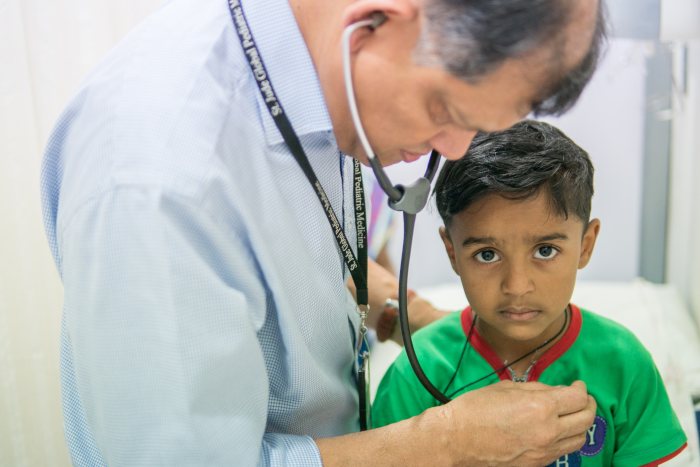
I wanted to realise two ambitions: to increase survival rates and, equally, to help families avoid entering poverty just by seeking treatment for their child.
Scaling up
Partly because of the success achieved thus far, with his research increasing survival rates in the Kolkata hospital from 65% in 2014 to 80% in 2019, the hospital has run out of space.
Strong support from Dr Mammen Chandy, Director of TMC, led to a new facility for children opening in April 2019, which will triple the numbers of patients currently treated. A dedicated translational cancer research centre (Tata Translational Cancer Research Centre) built and headed by Professor Saha opened in April 2018. This union of research and treatment, with clinicians and scientists working closely together to identify solutions for patients with cancer across India, is inspired and modelled on similar approaches at Manchester.
Professor Saha modestly tells us that all he has done is roll out NHS principles of collaboration. However, watching him in his bustling Thursday clinic reminds us that this is a story about so much more.
Children move freely between their parent’s laps and his, clambering on his knee while he talks to other patients and swarming in and out of his office excitedly chatting to him in different dialects. The affection he uses when speaking about his patients and their families is evidently returned, his links to the region perhaps explaining how he so easily traverses one family to another.
“I’m happiest being in the clinic and seeing families and their children,” he smiles.
“I met the father of a family in the hospital canteen recently and he wanted to pay for my tea. I said when his son is cured we’d have a big party and we’ll all be there. He turned to me and said: ‘Whatever happens to my son, you’ve tried to help us and you’ll never know the love and respect that I have for you’. That’s it.”
Standardising treatments
In five years Professor Saha has created a national hub of cancer centres and linked up five major paediatric centres across India. These in turn have linked up with their local hospitals to create a modernised health care system with standardisation in treatment and care which is yielding lifesaving results.
For a man constantly moving, it’s no surprise that neither is his research. He’s currently working on expanding the research programme with partners in Manchester, including The Christie and CRUK, using multidisciplinary expertise to identify the peculiarities of cancers seen in India compared to the UK, with a view to developing better treatments and gentler cures.
It appears Manchester’s approach has been a catalyst for change in India, with more hospitals following – and building on – the model he implemented.
“People are using the protocols we’ve developed but they’re also bettering them, learning from my mistakes! And that’s how it should be,” he laughs.
“Universities are places of learning – and what is the purpose of learning if not to use it and share it?”
Although it should feel a long way away from Manchester, it doesn’t. It feels like there’s a little bit of Manchester in this corner of Kolkata. Listening to Professor Saha talk about principles of the Manchester-born NHS, and the commitment of our university to make a difference, the world suddenly seems much smaller.
It’s perhaps easy to see why this global commute probably doesn’t seem such a big distance after all.
Cancer is one of the University’s research beacons.

